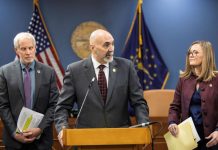General Assembly Will Decide If Sports Wagering Is A Safe Bet
By James Polston
TheStatehouseFile.com
INDIANAPOLIS—A lawmaker who plans to introduce legislation to legalize sports wagering wants Indiana to be able to cash in on the latest round of state-sanctioned gambling.
“As we all know, there is illegal sports betting happening all over the place in Indiana. Some say it’s as high as $300 million,†said Sen. Jon Ford, R-Terre Haute. “So, if we keep the barriers to entry low and we keep the tax relatively low, we will capture more of that illegal business.â€
Gambling revenue from the state’s riverboats and racinos produced Indiana $87 million in the fiscal year 2019.
Indiana took the first tentative steps in October when an interim study committee voted unanimously for the General Assembly to consider legislation that permits sports wagering. One of the goals is to attempt to reduce the size of the illegal gambling market.
Ford authored legislation during the 2018 session, but it failed and is working on a proposal for the 2019 session.
“I think we have a good chance,†Ford said of prospects for the session that starts in January. “I think my colleagues understand that to be competitive with other gaming states, this is something we’re certainly going to have to take a hard look at.â€
Ford said the General Assembly needs to look at protecting consumers and believes the age requirement to bet on sporting events should be 21. He added there should be a mobile component to sports wagering.
“For mobile, they need to go to a physical casino and have their verification done there on site,†Ford said of what the proposed law should contain.
If sports wagering is adopted by the General Assembly, Indiana would become the ninth state making it legal, joining Nevada, Delaware, New Jersey, Mississippi, West Virginia, New Mexico, Pennsylvania, and Rhode Island.
Although other states are wrestling with the idea, Ford believes Indiana is a leader, dating back to the regulations developed around daily fantasy sports sites three years ago.
“You look at other states but I think we often forget our own path,†Ford said.
Sites like FanDuel and DraftKings allow users to select a lineup of players from different leagues and join games against opponents across the globe. Participants can win registration money back by outscoring other teams in their given league.
Christina Gray, executive director of the Indiana Council for Problem Gambling (ICPG), said her organization maintains a neutral position on sports wagering legislation. But ICPG is calling for at least one percent of revenue collected on sports wagering to be used for preventing and treating gambling addiction.
“We’ve had so many things in the last 30 years that they’ve approved gambling wise that I just hope they do set aside money to handle people who have problems with gambling,†Gray said.
The ICPG was founded in 1996 by a group of individuals and organizations with the goal to ensure that help was available for problem gamblers.
The ICPG also wants legislation to require betting operators to implement responsible gaming programs, assign a regulatory agency to enforce those programs and regulations set by the law, conduct surveys focused on adults and set a minimum age requirement.
In the past, professional sports leagues, particularly the NFL, have opposed legalizing sports wagering but have since softened their stance.
Micah Clark of the American Family Association of Indiana said sports wagering is not at the top of his organization’s agenda but has opposed gaming in previous years.
FOOTNOTE: James Polston is a reporter for TheStatehouseFile.com, a news website powered by Franklin College journalism students.





Wonder what the odds are on it’s passage?
Comments are closed.